

Activities with Bee-Bots & Blue-Bots – Robots for Primary Schools in the 21st Century. "Emotional robots", Connected, level 4, November 2018 / Technology in the School Journal and Connected / Resources. 15 February 2019 This article explores the development of artificial intelligence (AI) from a social and ethical perspective.
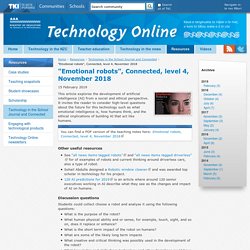
It invites the reader to consider high-level questions about the future for this technology such as what emotional intelligence is, how humans think, and the ethical implications of building AI that act like humans. Other useful resources See “all news items tagged robots” and “all news items tagged driverless” for of examples of robots and current thinking around driverless cars, also a type of robot. Sohail Abdulla designed a Robotic window cleaner and was awarded top scholar in technology for his project. 120 AI predictions for 2019 is an article where around 120 senior executives working in AI describe what they see as the changes and impact of AI on humans. Discussion questions Students could collect choose a robot and analyse it using the following questions: What is the purpose of the robot?
Actura New Zealand – Actura New Zealand.
CAS Computing Progression Pathways KS1 (Y1) to KS3 (Y9) by topic Computing At School. CAS Computing Progression Pathways KS1 (Y1) to KS3 (Y9) by topic Created by Mark Dorling last edited Nov 03 2015 by Mark Dorling There is a PDF document available for download that explains how the CAS Computing Progression Pathways can used both with and without Digital Badges.
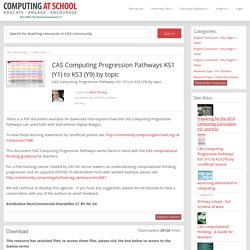
To view these learning statements by ‘unofficial’ please see: This document ‘CAS Computing Progression Pathways’ works hand in hand with the CAS computational thinking guidance for teachers’. For a free training course created by CAS for senior leaders on understanding computational thinking, progression and an updated OFSTED S5 observation form with worked example please see: We will continue to develop this agenda – if you have any suggestion, please do not hesitate to have a conversation with any of the authors or email feedback.
Attribution-NonCommercial-ShareAlike CC BY-NC-SA.
Scratch. Sphero. Ollie robots. Edison robots. Lego mindstorms. VEX robots. CS Unplugged. Makey makey. Rasberry PI. 3D printing. 4D printing. Hologram challenge make a3d hologram projector to use on iPad/phone/screen including laptop. Bristlebots. Computer Science Field Guide. TechLeap NZ. #FindingRosieNZ :Dr Mahsa Mohaghegh. Hello Ruby. Computer Science Education Week: Guillermo's Pick. Computer Science Education Week: Eileen's Pick. What is the Internet? Programming with VEX IQ – Expedition Atlantis. Description It's the year 2023 and Atlantis has been discovered deep in the ocean, off of the coast of Africa.
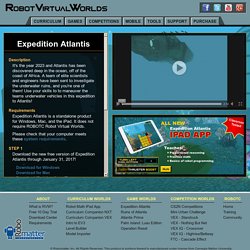
A team of elite scientists and engineers have been sent to investigate the underwater ruins, and you're one of them! Use your skills to to maneuver the teams underwater vehicles in this expedition to Atlantis! Requirements Expedition Atlantis is a standalone product for Windows, Mac, and the iPad. Please check that your computer meets these system requirements. Download the new free version of Expedition Atlantis through January 31, 2017! Download and read through the Expedition Atlantis Teacher’s Guide. Play the game! Teacher Resources A Teacher's Guide and powerpoint is available. A non-expiring version of Expedition Atlantis is included in the purchase of: Introduction to Programming VEX IQ Introduction to Programming EV3. Connected colors / real-time face tracking and 3d projection mapping. Robotic.
DARPA Robotics Challenge 2013: A Woodstock for Robots. Google's SCHAFT robot wins DARPA Robotics Challenge Trials 2013. The SCHAFT robot beat out five other teams in the Track A category to win the DARPA Robotics Challenge 2013 Trial held December 20 and 21, 2013.
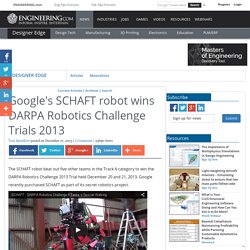
Google recently purchased SCHAFT as part of its secret robotics project. In total four different tracks of robots competed in the challenge trial, with Track A being DARPA funded teams and Tracks B, C and D receiving smaller levels of funding and allow for different levels of participation. MIT, WPI, Virginia Tech and Carnegie Mellon are some of the most prominent collegiate teams that participated. Eight tasks in total were set up to allow the robots to test the mobility, dexterity, manipulation, perception and operator control mechanisms of the robots. The goal of the challenge is to transform the field of robotics and move forward development of autonomous bots. The eight tasks are built to simulate the acts needed during a natural disaster. Each task has a set of constraints, starting conditions and sub-tasks that can be completed. A guide to the best robot kits available - Razor Robotics. ASURO is a tiny mobile robot developed for educational purposes by DLR, the German aerospace centre.
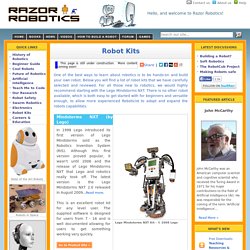
It is very flexible and completely programmable in C. Assembly is easy for experienced electronic technicians and feasible for a novice. Except for the printed circuit boards (PCB) only standard parts are utilised and freeware tools can be used for programming. Therefore ASURO is exceptionally suitable as an introduction into processor-controlled hobby electronics, for projects in schools and universities, for studies and adult education centres. Special tools, which are freeware for private users, have been used for all electronic development phases and software design, proving that robots can be designed without expensive tools or machines.